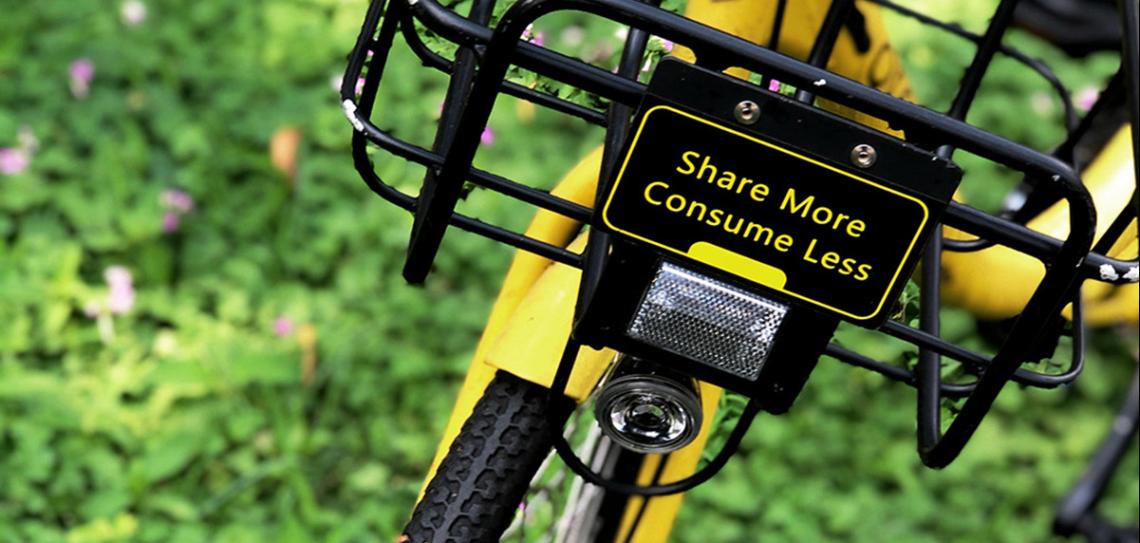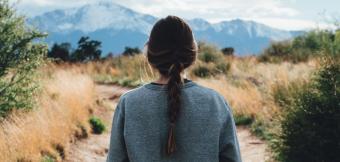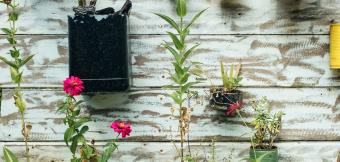
Think differently
Tackling climate change calls us to a new relationship with nature, and lives of greater simplicity. We need to move from anxiety about the future to empowered, positive action. The simple ethics of Earth Care, People Care and Fair Share can guide us in restoring the planet and its people.

Thinking differently about nature and the economy
Climate change isn’t an isolated phenomenon, but a symptom of the broken relationship between humanity and nature. People who have no connection to nature don't value it or fight to protect it. The first step to tackling climate change is recognising our fundamental connection to nature and our dependence on a healthy planet for our future survival. From this recognition comes a healthier lifestyle of greater simplicity, fewer possessions, stronger community, more making and less buying. Actions like; 26: 'Protect and restore forests', 5: 'Protect and restore wetlands', 48: 'Build soil health and 9: 'Plant and nurture trees' provide great opportunities to restore your own connection to nature.
The 52 Climate Actions project is built on the three permaculture ethics of Earth Care, People Care and Fair Share. The three ethics are included in every action. These non-dogmatic, non-religious, non-political and self-explanatory ethics can unite people of widely differing belief systems around simple, easy to understand values and behaviours. The current problems faced by the planet stem from actions that have ignored one or more of these ethics.
Two central principles of permaculture are 'The problem is the solution' and 'Work with nature, not against nature'. These two key attitudes can help us turn the huge challenge of climate change into a way of positively addressing many of the significant problems of our time. Another core principle is 'Each element fulfills many functions'; you'll see that each of the 52 Actions has multiple benefits, well beyond climate change. You can learn more about these ethics and principles by taking Action 8: 'Study permaculture'.
Climate change cannot be tackled without big changes in the economic system. Actions such as; 8: ‘Pay producers properly’, 42: ‘Eat local, seasonal food’, 21: 'Farm regeneratively' and 52: ‘Avoid seasonal excess’ point to a regenerative economy where positive relationships between producers and consumers are restored. The emphasis needs to be on buying fewer things; and when we do, focussing on greater quality and durability.
Alternatives to private cars need to reshape our cities around shorter journeys by bike, bus and train, while online contact should replace much international travel. Our eating habits need to include more local seasonal food and less meat. All these changes mean organising our lives differently and adopting a new set of assumptions as to what is ‘normal’.
If widely adopted, these actions would shift the economy towards a high skill, high wage, high value model of production and farming. There would be much less waste, and more emphasis on finding positive uses for so-called ‘waste’ products in a circular economy.

Thinking differently about the future
It’s an entirely natural reaction to feel anxious, depressed or overwhelmed by climate change. But getting stuck in those feelings doesn't help us or the planet. Realising there are many things you can do that will make a real difference to both mitigating and adapting to climate change is essential. The most important change in our thinking is the one that moves us from being passive victims to active opponents of climate change and its social, cultural and economic causes, and active creators of positive alternatives. You can read more about this in Action 41: 'Look after your mental health'.
The ethic of People Care includes Self Care; recognising and meeting your own fundamental needs is an important part of addressing climate change without guilt or burn out. Some environmental thinking encourages a ‘hair shirt’ mentality of self-denial and guilt. But this is a poor basis for bringing about long term global change. Living simply doesn’t mean living miserably, which is why actions like; 33: 'Follow your passion' and 14: 'Hold a party' are really important. Many other actions have financial and health benefits and can improve your happiness and quality of life.
Responding to climate change calls us beyond just sustainability (maintaining the status quo) to regeneration (making things better). It actually presents an amazing opportunity for humanity to do things differently. It offers multiple opportunities to address other current crises: pollution, economic inequality, loss of biodiversity, breakdown of community, the crisis in physical and mental health and runaway greed.
As the climate changes, millions are threatened by disasters such as hurricanes, wildfires, floods, extreme heat and drought - many for the first time. These climate changes are here to stay, but thinking creatively about adaptation can greatly reduce the impact they have. Redesigning your house, land and community will significantly reduce the impact of climate disasters and increase the recovery rate for you and others.
Rediscovering community is vital. People are more likely to follow through on an action if they commit to it together, while many actions such as; 19: 'Make compost' and 10: 'Generate your own electricity' are extra powerful when delivered at community level. Whole communities will be affected by climate change, and almost all adaptation solutions need to be undertaken at a community level. We need to learn to rely on each other much more and be ready to both offer and ask for help.
One final point: some environmentalists believe it would be better if humanity became extinct. But humans are a part of natural systems and can live in harmony with them. Human-managed ecosystems can have equal or greater biodiversity than wild ones, as seen in systems managed by indigenous peoples and by regenerative farmers. The ethics of People Care and Earth Care can be, and should be, wholly compatible and complementary.
Picture credits: 1) Pop Zebra - unspash.com 2) Photo: Nikita Kachanovsky - unsplash.com 3) Photo: Randy Jacob - unsplash.com
Spend more time in nature
Choose to live more simply
Get to know your community better
Think Earth Care, People Care and Fair Share whenever you spend money



